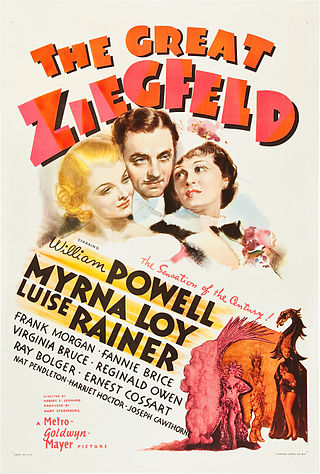
The Great Ziegfeld is a 1936 American musical drama film directed by Robert Z. Leonard and produced by Hunt Stromberg. It stars William Powell as the theatrical impresario Florenz "Flo" Ziegfeld Jr., Luise Rainer as Anna Held, and Myrna Loy as Billie Burke.

Rodney Stephen Steiger was an American actor, noted for his portrayal of offbeat, often volatile and crazed characters. Ranked as "one of Hollywood's most charismatic and dynamic stars", he is closely associated with the art of method acting, embodying the characters he played, which at times led to clashes with directors and co-stars. He starred as Marlon Brando's mobster brother Charley in On the Waterfront (1954), the title character Sol Nazerman in The Pawnbroker (1964) which won him the Silver Bear for Best Actor, and as police chief Bill Gillespie opposite Sidney Poitier in the film In the Heat of the Night (1967) which won him the Academy Award for Best Actor.
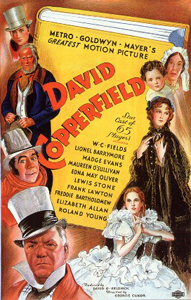
David Copperfield is a 1935 American film released by Metro-Goldwyn-Mayer based upon Charles Dickens' 1850 novel The Personal History, Adventures, Experience, & Observation of David Copperfield the Younger.
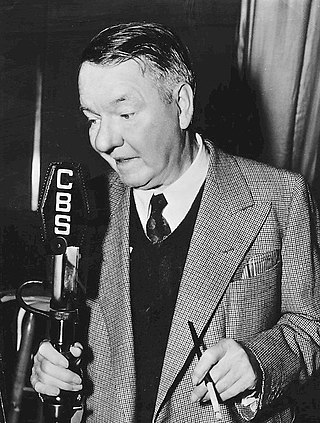
William Claude Dukenfield, better known as W. C. Fields, was an American actor, comedian, juggler, and writer.

Valerie Ritchie Perrine is an American retired actress. For her role as Honey Bruce in the 1974 film Lenny, she won the BAFTA Award for Most Promising Newcomer to Leading Film Roles, the Cannes Film Festival Award for Best Actress, and was nominated for the Academy Award for Best Actress. Her other film appearances include Superman (1978), The Electric Horseman (1979), and Superman II (1980).
Carlotta Monti was an American film actress, who was W. C. Fields' companion in his last years.
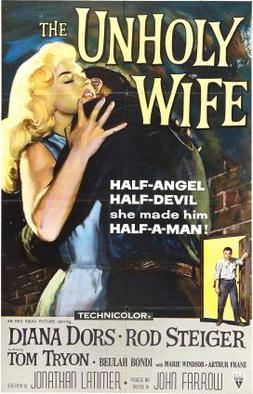
The Unholy Wife is a 1957 Technicolor film noir crime film produced and directed by John Farrow at RKO Radio Pictures, but released by Universal Pictures as RKO was in the process of ceasing its film activities. The film features Diana Dors, Rod Steiger, Tom Tryon and Beulah Bondi. The screenplay was written by William Durkee and Jonathan Latimer

Dinner at Eight is a 1933 American pre-Code comedy-drama film directed by George Cukor from a screenplay by Frances Marion and Herman J. Mankiewicz, based on George S. Kaufman and Edna Ferber's 1932 play of the same title. The film features an ensemble cast of Marie Dressler, John Barrymore, Wallace Beery, Jean Harlow, Lionel Barrymore, Lee Tracy, Edmund Lowe, and Billie Burke.
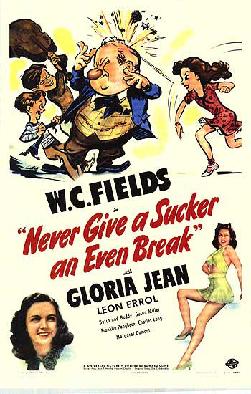
Never Give a Sucker an Even Break is a 1941 American comedy film directed by Edward F. Cline and starring W. C. Fields, Gloria Jean and Leon Errol. Fields also wrote the original story, under the pseudonym Otis Criblecoblis. Fields plays himself, promoting an extravagant screenplay he has written. As he describes the script to a skeptical producer, the often surreal scenes are shown. It was produced and distributed by Universal Pictures. In some international releases it was known by the alternative title What a Man!.

Guncrazy is a 1992 American crime drama film inspired by the 1950 film Gun Crazy. It was directed by Tamra Davis in her feature film directorial debut, written by Matthew Bright and starring Drew Barrymore. Davis had read the script in 1985, but filming did not begin until November 1991. The film was shown at the Cannes Film Festival on May 14, 1992, and aired on Showtime beginning later that year. The film had a limited theatrical release in January 1993.

John Decker was a painter, set designer and caricaturist in Hollywood during the 1930s and 1940s.
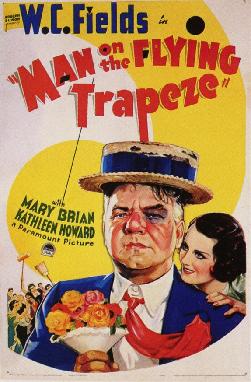
Man on the Flying Trapeze is a 1935 American comedy film starring W. C. Fields as a henpecked husband who experiences a series of misadventures while taking a day off from work to attend a wrestling match. As with his other roles of this nature, Fields is put-upon throughout the film, but triumphs in the end. This was the final film directed by Clyde Bruckman.

Gable and Lombard is a 1976 American biographical film directed by Sidney J. Furie. The screenplay by Barry Sandler is based on the romance and consequent marriage of screen stars Clark Gable and Carole Lombard. The original music score was composed by Michel Legrand.
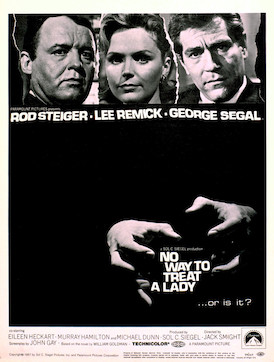
No Way to Treat a Lady is a 1968 American psychological thriller film with elements of black comedy, directed by Jack Smight, and starring Rod Steiger, Lee Remick, George Segal, and Eileen Heckart. Adapted by John Gay from William Goldman's 1964 novel of the same name, it follows a serial killer in New York City who impersonates various characters in order to gain the trust of women before murdering them.

The Last Producer is a 2000 American drama film directed by and starring Burt Reynolds. It also featured Sean Astin, Ann-Margret, Lauren Holly, Rod Steiger, and Benjamin Bratt. It was also referred to as The Final Hit in final packaging and promotional materials. It is the final film to be directed by Reynolds before his death in 2018.

The Illustrated Man is a 1969 American dark science fiction drama film directed by Jack Smight and starring Rod Steiger as a man whose tattoos on his body represent visions of frightening futures. The film is based on three short stories from the 1951 collection The Illustrated Man by Ray Bradbury: "The Veldt," "The Long Rain," and "The Last Night of the World."

Off the Menu: The Last Days of Chasen's is a 1997 American documentary film about famous Los Angeles restaurant, Chasen's directed by Shari Springer Berman and Robert Pulcini.
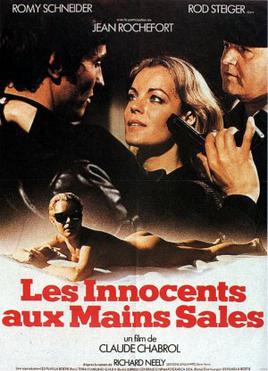
Innocents with Dirty Hands a.k.a. Dirty Hands, or in the original French Les innocents aux mains sales, is a 1975 psychological thriller film written and directed by Claude Chabrol from a novel The Damned Innocents by Richard Neely. It stars Romy Schneider and Rod Steiger.

Rod Steiger was an American actor who had an extensive career in film, television, and stage. He made his stage debut in 1946 with Civic Repertory Theatre's production of the melodrama Curse you, Jack Dalton!. Four years later, he played onstage in a production of An Enemy of the People at the Music Box Theatre. A small role in Fred Zinnemann's Teresa (1951) marked his film debut. In 1953, he played the title role in the teleplay "Marty" to critical praise. His breakthrough role came with the crime drama On the Waterfront (1954), which earned him an Academy Award for Best Supporting Actor nomination, and subsequent appearance in Fred Zinnemann's musical Oklahoma!.

The Flying Dutchman is an American film of 2000, directed by Robin P. Murray and starring Catherine Oxenberg, Eric Roberts, and Rod Steiger.

















